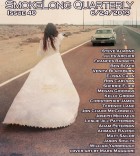Tell us a little bit about how this story came to be.
My wife, Meagan, and I were watching RuPaul’s Drag Race, and one of the challenges that particular week for the contestants was performing a skit with celebrity interpretations based around the premise of Match Game. Meagan and I both remembered watching reruns of the original Match Game as kids, so we were inspired to record some episodes off cable and became briefly re-obsessed. The idea for the story came when I began to think of watching the show when I was younger—in my case, probably about 16. I thought how strange it was that my wife and I had both had this same experience connecting with this old ’70s game show, and I began to wonder about why that might be. The story developed from there, but it really came together for me when I wrote the last line. Once I did, I went back through the story to rework it so that everything was an expression of this idea—that which is right there, but can’t be spoken.
What do you think draws these kids to programming that’s decades older than they are? What in the format of Match Game is particularly enticing?
I think that for a certain type of young person—and I was this type of young person—there is something immediately attractive about something older. Part of it of course is that you can point and laugh—the clothes, the way people used to talk. You can feel sort of smug about the idea that lapels used to look so silly. But more than that, you are literally looking at another time. So, I don’t think it’s just the kitsch factor—it’s actually a feeling that you can inhabit a different era and see what people were like back then. So, it’s a form of escapism and imagination that you don’t get with something that is contemporary, that is made by people right now.
When it comes to Match Game, I think the appeal is that it is so performative and campy and hilarious (not always intentionally), that it makes very overt the things that kids around puberty are constantly trying to hide. But, it does it in this very safe way. They can’t say penis. It’s all puns. So, the show was fascinating to me because it becomes this way for these kids to safely explore these ideas of sexuality. Depending on where you live and how you were brought up, and when you happened to be watching it, Charles Nelson Reilly might be your first glimpse of a gay person. And with that, too—even though there was no secret that he was gay, it was all euphemisms and winks to the camera. The whole show is this really interesting play between surface and meaning.
TV usually gets a bad rap for being anaesthetizing, but here, a beautiful, visceral intimacy unfolds while in front of the tube. Do you think such mediated experiences might actually open up “safe spaces” for human connection? Would the narrator have tried this kiss in any other circumstance?
I think you’re onto something about TV and other media opening up possibilities for human connection. I don’t think the narrator would have tried the kiss if it weren’t for the show they were watching. There’s a reason so many first kisses happen in movie theaters—and it’s not only that it’s dark and the parents aren’t there. For me, TV at its best has always been an extremely social medium. Watching RuPaul with my wife, or watching a show like Lost or Mad Men with friends. Something very interesting happens because unlike with other media, you can simultaneously engage with the story and the people in the room with you. It becomes something you share in a way that you never can with a book. Of course, that’s what’s good about books—the complete intimacy of them. But, I think this idea that TV is this force that is deadening to us, that is making us less creative and intelligent, is an oversimplification.
What’s your favorite (or most loathed) game show of all time?
Honestly, I think my favorite is probably Match Game. But since I’ve talked it to death, let’s go with my most loathed, which would have to be Are You Smarter than a Fifth Grader? That might be a serious quandary for Jeff Foxworthy, but for most of us (I hope) it’s not really an issue. I always found that basic assumption about the viewing public’s lack of intelligence to be really obnoxious.



 The core workshop of SmokeLong Fitness is all in writing, so you can take part from anywhere at anytime. We are excited about creating a supportive, consistent and structured environment for flash writers to work on their craft in a community. We are thrilled and proud to say that our workshop participants have won, placed, or been listed in every major flash competition. Community works.
The core workshop of SmokeLong Fitness is all in writing, so you can take part from anywhere at anytime. We are excited about creating a supportive, consistent and structured environment for flash writers to work on their craft in a community. We are thrilled and proud to say that our workshop participants have won, placed, or been listed in every major flash competition. Community works.